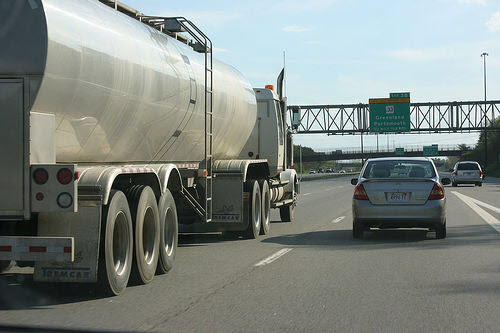The Trucking Industry
Our nation is absolutely, completely dependent on our trucking systems. Without transport carrying goods and supplies around the country every day, normal business would literally come to a screeching halt. We need this commerce, but we also need to cut down on the damage it is doing to the environment. In 2008 heavy duty vehicles and freight haulage accounted for over 17% of the US transportation total CO2 emissions. And truck travel is expected to continue growing. That’s why it’s so important that the government and the trucking industry are taking measures to help increase their fuel efficacy and reduce their contribution to the exorbitant release of carbon emissions.
- Better Trucks – One of the biggest ways we can improve the fuel efficiency of commercial transport is through the trucks themselves. Individual trucks of varying sizes and specifications will be subject to different kinds of structural alterations. But generally speaking, increasing the aerodynamic drag and rollover resistance in any model will result in a substantial CO2 reduction for each vehicle. Also, like with personal cars but on a much bigger scale, improper tire inflation is a huge fuel waster for heavy haul trucks. But improved tire maintenance management systems can help increase fuel efficiency in all trucks.
- Smarter Routes – Logistics failures represent a significant chunk of the gratuitous carbon emissions in the commercial transport industry. Whether it’s wasted space or traveling unnecessary miles, often poor planning and communication is the root of the problem. Little things, like left-hand turns, low speed limits and traffic, force trucks to idle and consume gas. Oversight or ignorance can cause trucks to haul empty trailers hundreds of miles. By implementing load and route optimization strategies, the trucking industry can generate a significant decrease in their yearly fuel consumption.
- Green Initiatives – The freight haul sector is also taking part in other initiatives intended to abate their immense carbon emissions. Trying to utilize hybrid technology and alternative fuels in freight trucks, are among the fundamental fuel related enterprises. Outside of the trucks, many companies are participating in programs like purchasing carbon offsets and the EPA SmartWay partnership. The capital raised by carbon offsets directs funds toward programs that focus on alternative energy development and other green programs. While SmartWay is a government project designed to help make fuel efficient technology more available to individuals and companies.
After shouldering so much responsibility for our annual carbon emission the trucking industry is compelled to address their mass fuel consumption. They are making strides toward the best possible scenarios, but it will not diminish the demand for trucks or our economic dependence on ground transport.
Next: the carbon emissions of transportation infrastructure construction and maintenance (click the page link below)
Image credit: ReneS at Flickr under a Creative Commons license


